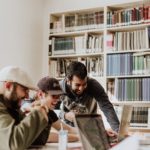 While the internet gives us so much knowledge at our fingertips, it also gives us a plethora of ways in which to distract ourselves from the task at hand. Research from the Rotman School demonstrates this clearly, as it shows that teenagers often learn better when they have restricted access to the internet.
While the internet gives us so much knowledge at our fingertips, it also gives us a plethora of ways in which to distract ourselves from the task at hand. Research from the Rotman School demonstrates this clearly, as it shows that teenagers often learn better when they have restricted access to the internet.
The only change to this is when students are working under the right controls, at which point they can explore high-quality and engaging content that can support them academically.
Supported learning
The researchers worked with four state-run boarding schools in Malawi at a time when internet adoption was being increased rapidly but the four schools largely were without web access and mobile phones were not permitted.
A random sample of 300 students from the schools were chosen to gain access to a digital library after school each day and over the weekends throughout the school year. The library was complete with fast-charging smartphones, with Wikipedia the only website that was available. A teacher was present in the library but the students were largely free to do as they please.
The experiment found that the students with access to the digital library seemed to do better in subsequent exams, with this especially so for lower-achieving students.
“Teachers and policymakers have viewed the internet as a problem,” the researchers explain. “We wanted to show that if you can carve out the part of the internet that is both compelling for teenagers and educational, you can get the best of it while not getting the worst of it.”
More study needed
The results should be caveated with the fact that most of the gains were in English, which as the majority of the internet activity undertaken by the students was not school-related the researchers believe could be simply due to the students reaching more material in English.
“They read about everything,” the researchers explain. “You would see the same student jumping around to entertainment, to news, to sex, to something for school, to quantum physics.”
When quizzed, the students said that they generally trusted the material they read, especially when it was material not usually covered in textbooks, such as on world news. They also said that they preferred using Wikipedia to other sources of information, even compared to their textbooks.
This suggests that the online encyclopedia could be a valuable and low-cost way to provide students with access to high-quality material, especially compared to donated books that might rapidly become out of date or not meet the needs and interests of the students.
“It’s not that expensive to buy a set of smartphones,” the authors conclude. “The schools have staff who can manage them. It’s a low-cost, high benefit intervention for poor countries.”